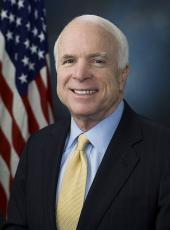Mr. Chairman, thank you for holding this hearing today, and thank you for giving me the opportunity to speak in support of S. 2590, the Federal Funding Accountability and Transparency Act. I am pleased to be an original cosponsor of this bill and I am confident its passage would go a long way in helping to reign in federal spending.
This bill would direct the Office of Management and Budget (OMB) to create a searchable database -- available to the public at no cost -- that lists each entity receiving federal funding. The website would show the amount of federal funds the entity received in each of the last 10 fiscal years, an itemized breakdown of each transaction, the location of the entity, and a "unique identifier" for the entity and its parent entity.
As you know, Mr. Chairman, this bill has received support from both sides of the aisle and from a bipartisan coalition of over 75 organizations. In my view, the reason for such broad support is simple; people are beginning to realize that the only way to control spending and ensure accountability is to let the American people see exactly how their money is being spent.
Critics of this bill have suggested that the requirements of the legislation are too burdensome and that it would be too costly and take too much work to collect and post this data. I don't buy that argument, Mr. Chairman. OMB already maintains the data necessary for this website, and the technology clearly exists to implement the requirements of this bill. More importantly, the cost of the waste, fraud, and abuse that can remain hidden in the system without such a disclosure is much more costly to the American taxpayer than the implementation of this bill.
Our nation's future economic success rests in part on the decisions we make today -- and the ones we put off. We are facing some dire fiscal challenges in the days ahead. According to the Government Accountability Office (GAO), the unfunded federal financial burden, such as public debt, future Social Security, Medicare, and Medicaid payments, totals more than $46 trillion, or $156,000 per man, woman and child. According to David Walker, the head of the GAO, for a family, this burden is "like having a $750,000 mortgage -- and no house." But, instead of fixing the problem, and fixing it will not be easy, we've only succeeded in making it bigger, more unstable, more complicated, and much, much more expensive.
Time and time again, attempts have been made to slow the growth of federal spending and time and time again those efforts have failed. We need a new approach. I've long believed that real budgetary reforms won't happen until the American people demand greater accountability for how their tax dollars are being spent. This bill could be just the tool necessary to put us on the track to real accountability and reform. When American workers look at their pay-stubs each month and see what has been sent to Washington, they ought to be able to learn exactly how that money is being spent. When they see that we are spending millions on bridges to nowhere, teapot museums, and zoos -- they'll demand accountability from their elected officials, Mr. Chairman -- I'm sure of it.
A recent editorial on Tennessean.com stated that "Congress needs to open up and shed light on its business in many ways. With an accessible database of grants and contracts, the public may see spending it despises, and it may see spending that it approves of, down to the last penny. The only reason to oppose compiling the information for public use is if the government has something to hide."
I am hopeful that a searchable database of federal spending will help reduce the ever-increasing number of earmarks in the annual appropriations bills. The growth in earmarked funding during the past 12 years has been staggering. In 1994, there were 4,126 earmarks. In 2005, there were 15,877-- an increase of nearly 400 percent! The largest number of earmarks have occurred in the last three years -- 2004, 2005, and 2006. Now, let's consider the level of funding associated with those earmarks. The amount of earmarked funding increased from $23.2 billion in 1994 to $64 billion in FY 2006. Remarkably, it rose by 34 percent from 2005 to 2006, even though the actual number of earmarks decreased slightly. Earmarked dollars have doubled just since 2000, and more than tripled in the last 10 years. This is wrong and disgraceful and we urgently need to make some serious, meaningful changes.
Mr. Chairman, we simply must start making some very tough decisions around here if we are serious about improving our fiscal future. We need to be thinking about the future of America and the future generations who are going to be paying the tab for our continued spending. It is simply not fiscally responsible for us to continue with wasteful and unnecessary spending, while passing along good deals to the special interests and their lobbyists. We have had ample opportunities to tighten our belts in this town in recent years, and we have taken a pass each and every time. We can't put off the inevitable any longer. The American people have the right to know how and where their tax dollars are being spent.
Thank you again for holding this hearing today and for allowing me the opportunity to share my views.
John McCain, Remarks in Support of the Federal Funding Accountability and Transparency Act Online by Gerhard Peters and John T. Woolley, The American Presidency Project https://www.presidency.ucsb.edu/node/277435


